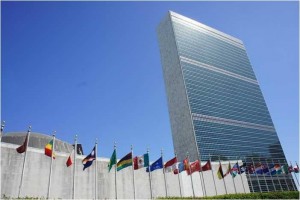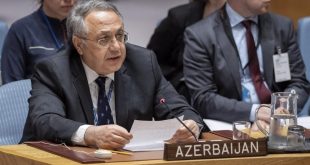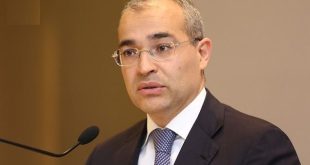
“The 70th anniversary of the United Nations is an opportunity to reflect – to look back on the UN’s history and take stock of its enduring achievements. It is also an opportunity to spotlight where the UN – and the international community as a whole – needs to redouble its efforts to meet current and future challenges across the three pillars of its work: peace and security, development, and human rights.” – Secretary-General Ban Ki-moon’s message for UN70
2015 marks the global celebration of the 70th anniversary of the United Nations, which is the most representative forum for discussions among the states on the issues of international concerns and the main international institution which occupies a central place in the system of international organizations.
In response to the horrors of Nazism the United Nations Organization (UNO, UN) was founded in 1945 upon the initiative of the victorious powers of the international peace and security, are to achieve international cooperation, development and human rights, as laid down in article 1 of the UN Charter.
Unites Nations also plays a crucial role in the contemporary international development and its Charter is a foundation of modern international law, a kind of universally accepted code of conduct of states and their relationships.
It commits the organization to, among other things, “promote social progress and better standards of life in larger freedom,” to “reaffirm faith in fundamental human rights, in the dignity and worth of the human person, in the equal rights of men and women and of nations large and small” and to “save succeeding generations from the scourge of war”.
As we mark the 70th anniversary of the United Nations, we can also look back on proud pages of achievements in UN history, such as protecting global health, aiding refugees, preventing wars, empowerment women activity, advance international law and safeguard the environment.
The UN agencies such as UNICEF (the United Nations Children’s Fund), draws donations from governments and private donors to serve the needs of children and mothers in developing countries. It feeds more than 80 million people each year, has helped more than 2.6 billion people gain access to clean water and has brought new vaccines to more than 400 million of the world’s children. The World Health Organization, the specialized agency of the UN that helps governments manage public health crises and fight both communicable and non-communicable diseases, was the main driver behind the eradication of smallpox, an accomplishment that probably saved 150 million lives.
The UN also helps people survive wars and rebuild their lives and normal social activities after the violence has ended. It also calls those responsible for war to account. So, in the mid of 1990th in order to bring individuals to criminal liability the International Criminal Tribunal for the prosecution of persons responsible for serious violations of international humanitarian law committed in the territory of the former Yugoslavia and the International Criminal Tribunal for the prosecution of persons responsible for genocide and other serious violations of international humanitarian law committed in the territory of Rwanda and Rwandan citizens responsible for genocide and other international crimes, committed in the territory of neighboring states were established by the UN Security Council.
The fact that in order to justify the decision about creating this international courts the UN Security Council referred to the Chapter VII of the Charter of the United Nations, dedicated to the action with respect to threats to the peace, breaches of the peace, and acts of aggression was very remarkable.
Yes, the UN has produced major successes over its 70 years—and major failures. One of the main reasons for the lack of effectiveness of the Organization lies in its inability and unwillingness in some cases to ensure the implementation of its resolutions. While the UN Security Council is endowed with sufficient powers necessary for the proper execution of its resolutions by the member states of the UN, unfortunately sometimes it does not execute its resolutions or properly follow the application of the requirements of its verdicts.
International political commentators often use the word “relic” of the UN Security Council, laying in the use of this term has two main ideas: the first implies the absence of activity, the second – worship, despite the fact that the organization is more like a relic of the past. Although the UN’s role in a multipolar-world as the only global international organization capable of solving the problems of international security should be enhanced. The competence of the United Nations covers a wide range of problems. Moreover, currently, there is no real alternative to the UN, other organizations are only able to supplement its activities.
The adaptation of the UN to a dramatic shift in the international political landscape becomes demand of the time. The conceptual questions such as what should be the priorities of the Organization in modern era, of which its functions can be delegated to regional organizations or coalitions of states, what are the conditions and limits of the UN intervention in the internal affairs of sovereign states, as well as how to combine the principle of universality with a special status of the permanent members of the UN Security Council, etc. become relevant today.
It is obvious that taking into account also the recent worrying processes in the world it is high time to reform the UN, on which depends the future effectiveness and vitality of the Organization as well as peace and security in the world as a whole. The debate about the urgent need for change in the Organization has been continuing for a long time, but at the beginning of the new millennium, this issue has a special actuality.
For the its 70th anniversary the UN has created a new official logo: 70 STRONG UN. BETTER WORLD. It use to encourage for educational and public outreach projects advancing the goals laid down in the United Nations Charter, informing the public of the role of the United Nations in the modern era, and promoting informed world debate on the Organization in its 70th year and the world to which it belongs.
The success in the strengthening of the activity of the United Nations can be achieved only in case of renunciation from the policy of double standards in the activity of the UN and the demonstration of political will of great powers that are obliged to approach fairly in political and legal assessment of new threats to peace and security in the face of international conflicts and terrorism. Only the approach based on a solid foundation of international law can be a guarantor of sustainable international development at the contemporary stage of the UN activity.
Written by Najiba Mustafayeva
 Oval Useful news from Azerbaijan and Caucasus
Oval Useful news from Azerbaijan and Caucasus


